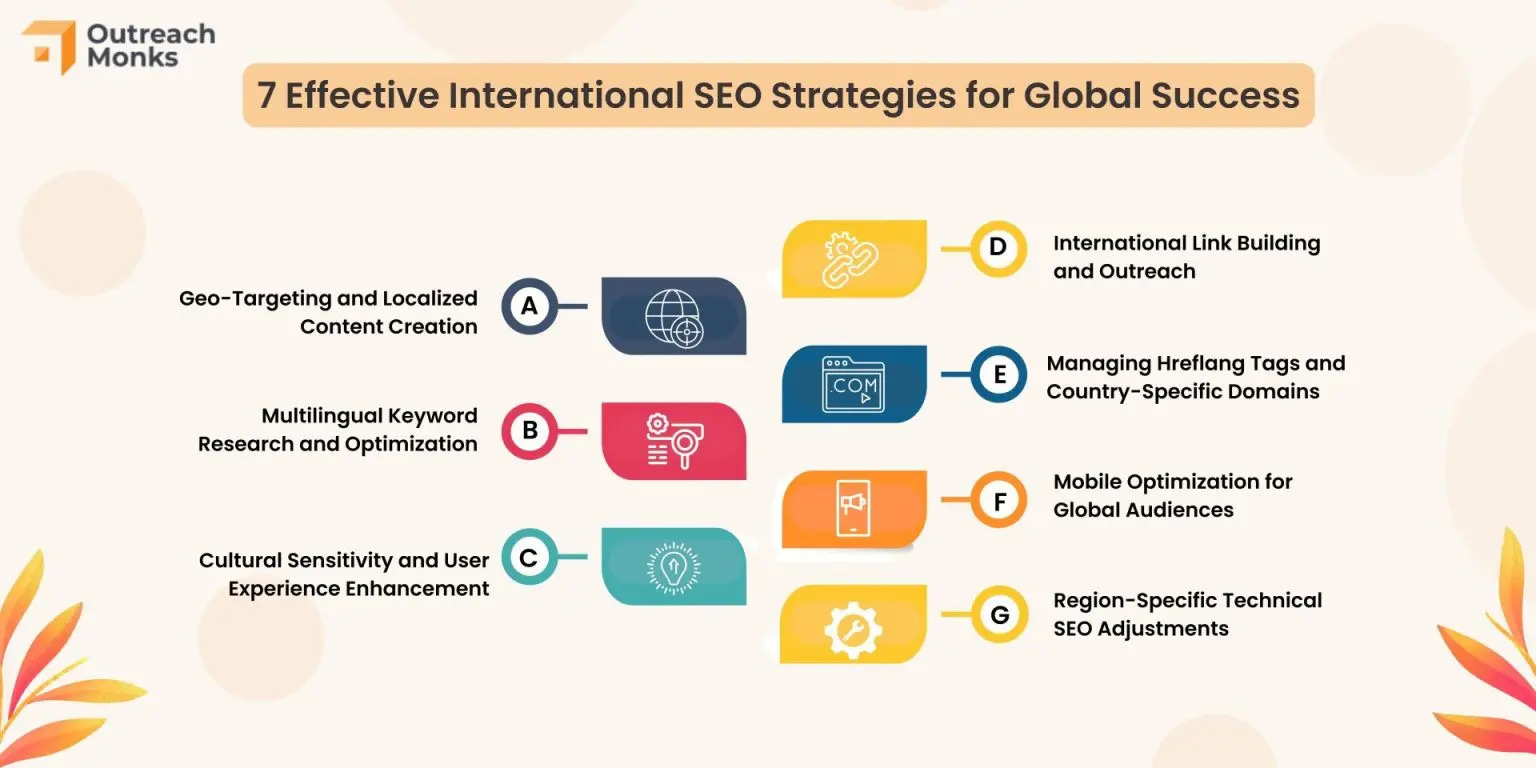As businesses expand beyond borders, having a global SEO strategy becomes crucial for reaching international audiences effectively. However, crafting an SEO strategy that works across different regions and cultures is no small feat. Through this blog, we aim to offer valuable insights on how to ensure your SEO strategy is global-ready, courtesy of the experience of our international SEO experts.
This comprehensive guide covers essential tips and strategies that we follow as an international SEO agency to optimise the global presence of our clients through SEO.

source: https://bit.ly/4bqYrTG
International SEO involves optimising your website to attract organic traffic from different countries and languages. Unlike standard SEO, it focuses on tailoring your content and technical setup to meet the diverse needs and search behaviours of international users. This involves various strategies, from hreflang tags and localised content to regional link-building and country-specific keyword research. If you want to seek specialised help for your brand, get in touch with our digital marketing agency in USA.
With globalisation, more businesses are targeting international markets. Our SEO company in USA and UK understands the growing need for this and adopts a strategy which allows you to tap into new markets, increase brand awareness, and drive conversions worldwide. Ignoring international SEO means missing out on significant opportunities for growth and revenue.
1. Conducting Comprehensive Market Research
Understanding Target Markets
Before diving into the technical aspects of international SEO, it’s crucial to understand your target markets. This involves researching the cultural, economic, and linguistic nuances of each region you plan to target. Tools like Google Market Finder can help identify potential markets based on your current traffic and conversion data.
Competitor Analysis
Analyse your competitors in each target market to understand what strategies they’re using. Look at their keywords, backlinks, content strategies, and how they engage with local audiences. This will provide insights into what works and help you identify gaps in your strategy.
Hreflang tags are essential for indicating the language and regional targeting of a webpage to search engines. Proper implementation ensures that users are directed to the correct version of your site based on their language and location. Misusing hreflang tags can lead to indexing issues and misdirected traffic.
Regularly audit your hreflang implementation to ensure there are no errors or inconsistencies.
Adapting Content for Local Audiences
Content localisation goes beyond translation; it involves adapting your content to resonate with local audiences. This includes using culturally relevant examples, local idioms, and ensuring that the tone and style match the local preferences.
Local Keyword Research
Keywords vary significantly across regions, even within the same language. Use tools like Google Keyword Planner and Ahrefs to conduct local keyword research. Focus on local search terms, slang, and phrases that are commonly used in your target markets. Long-tail keywords can also help capture specific local intents.
While Google dominates the search engine market globally, other search engines like Baidu in China, Yandex in Russia, and Naver in South Korea have significant market shares. Optimising for these search engines involves understanding their unique algorithms and ranking factors.
Specific Optimisation Techniques
Baidu: Prioritise simplified Chinese content, use local hosting, and ensure fast load times.
Yandex: Focus on user behaviour metrics, local backlinks, and content relevance.
Naver: Utilise Naver’s proprietary services like blogs and cafes to improve visibility.
Choose the right URL structure for your international websites. Options include:
Each option has its pros and cons. ccTLDs provide a strong local signal but require more resources to manage. Subdomains are easier to manage but may not carry as strong a local signal. Subdirectories are the easiest to manage but can dilute the local relevance.
Page speed is a critical ranking factor, especially for mobile users. Ensure your site loads quickly across all regions by using Content Delivery Networks (CDNs) and optimising images and code. Mobile optimisation is equally important, as mobile searches dominate in many regions.
Local backlinks are a key factor in improving your site’s authority and ranking in international markets. Focus on acquiring high-quality backlinks from local websites, blogs, and influencers.
Use tools like Google Analytics and Google Search Console to track your performance in different regions. Set up goals and conversions specific to each market to measure the effectiveness of your strategy.
Regular Audits and Adjustments
Regularly audit your international SEO efforts to identify issues and areas for improvement. Analyse your traffic, engagement, and conversion metrics to understand what’s working and what’s not. Be ready to adjust your strategy based on the data.
Overcoming Language Barriers
Leading experts emphasise the importance of working with native speakers for translation and content creation. Automated translation tools can miss cultural nuances and negatively impact user experience. Investing in professional translation services ensures your content is both accurate and engaging.
Navigating Local Regulations
Different countries have varying regulations regarding data privacy, advertising, and content. For example, the General Data Protection Regulation (GDPR) in Europe requires specific measures for handling user data. Ensure your SEO strategy complies with local laws to avoid penalties and build trust with local audiences.
Experts recommend a hybrid approach that balances global branding with local relevance. While maintaining a consistent brand voice globally, adapt your content and strategies to meet the specific needs of local markets. This balance ensures a cohesive global presence while effectively engaging local audiences.
Creating a global-ready SEO strategy involves a blend of technical expertise, cultural understanding, and strategic planning. By following these tips from our leading international SEO agency, you can effectively reach and engage audiences worldwide. Remember, international SEO is an ongoing process that requires regular monitoring, analysis, and adjustments to stay ahead in the dynamic global market.
Whether you’re just starting to explore international markets or looking to enhance your existing strategy, these insights will help you navigate the complexities of international SEO and achieve global success.